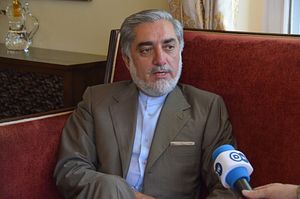This week, both Afghanistan’s President Ashraf Ghani and Abdullah Abdullah, its Chief Executive Officer (yes, CEO — he’s joked about this acronym, recently saying that it was like being a prime minister, but not fully) visited the United States to express gratitude and shore up continued American support for their country. The trip was well received by American politicians and Ghani’s address to a joint session of Congress was met with multiple standing ovations.
On Thursday, I attended a forum with Abdullah Abdullah at the Brooking Institution in Washington, DC. Abdullah, echoing statements made by Ghani, emphasized his government’s gratitude for American assistance, as well as a desire for continued cooperation with the United States on both economic and security matters. If one were to understand this in terms of the entire Middle East-South Asia region, this is an extraordinary sentiment. Most other American actions in the region — in Iraq, Syria, and Libya, for example — probably did more harm than good overall. Afghanistan, however, is one place where American action slowly helped a nation become a better place, albeit slowly and painfully.
A continued U.S. presence in Afghanistan would help the country continue its slow rise toward stability and should be welcomed by all parties in the region, lest an ungoverned space emerge in the heart of Asia. U.S. President Barack Obama’s decision to keep 9,800 American troops in Afghanistan to the end of the year, at the request of the Afghan government, should be seen as a positive development, because it is supported by most Afghans and could lead to a positive outcome. Interventions should be rare and measured, but when they are on a successful trajectory, they should not be abandoned just because other ill-advised interventions did not work. Afghanistan has improved drastically since the overthrow of the Taliban in 2001, with warlord activity declining and education and women’s rights improving, though slowly.
One point that Abdullah touched on quite frequently is the need for Afghanistan to move toward a decentralized (but not ungoverned) political system, instead of concentrating power in a president who can only be changed every five years. The president also appoints all of the country’s 34 provincial governors, meaning that locals do not get a say in electing their own leaders. In a country as diverse, mountainous, and ethnically fragmented as Afghanistan, this level of centralization seems excessive. A winner-take-all presidential system in a country as diverse as Afghanistan leaves many groups cut out of power. Most of Afghanistan’s neighbors in South Asia, such as India, Pakistan, and Nepal, are parliamentary democracies and have diffused political tensions through distributing power.
A switch to a parliamentary system would solve many of these issues, Abdullah argues, noting that Afghanistan should not risk dysfunction after each presidential election, all of which have been contested. Generally, non-Pashtun ethnic groups in Afghanistan favor decentralization more than Pashtuns, since centralization generally projects Pashtun influence across Afghanistan. Afghanistan’s previous leader, President Hamid Karzai, opposed decentralization and parliamentary government for the same reason that other individuals support it: Afghanistan is a deeply fragmented, mountainous country, and a decentralized government could tear the country apart.
However, as part of the deal that led to the unity government between Ghani and Abdullah after last year’s contested presidential election, Afghanistan will move gradually toward a more parliamentary system, though it is unclear to what extent Ghani will enable changes to go through. It is also unclear who the figurehead head of state would be in such a system: a president, as in India, or perhaps the old monarchy. Many American officials have also expressed support for a change to Afghanistan’s constitution, arguing that the system needs to be set up in a more inclusive way. This is ironic considering that the United States initially pushed for a strong president, modeled off of the American system, when the Afghan Constitution was drafted in 2004 — a doubly strange decision because American-occupied Iraq and Japan both ended up with parliamentary systems.
Several studies and political scientists have indicated that parliamentary systems lead to freer countries and less government deadlock as the executive and legislative functions are not diametrically opposed to each other. Presidential systems in developing countries tend to gradually concentrate power in the office of the executive. The path that Afghanistan takes will largely depend on how well Ghani and Abdullah can compromise and agree on the core issues of the form of governance that Afghanistan will have. While Afghanistan will probably make some moves in this direction in other to decrease political problems in the near future, larger changes will probably have to wait until more pressing issues — economics and security — are first dealt with.
































